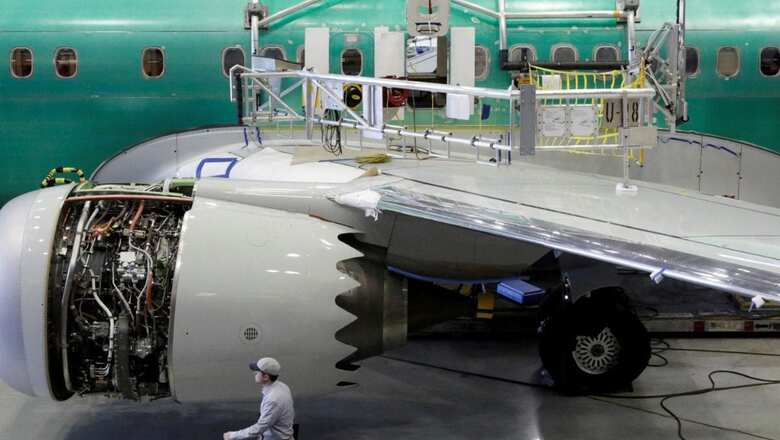
views
Boeing will refrain from commenting on its financial outlook while it focuses on quality control after a near-catastrophic 737 MAX flight earlier this month, the company said Wednesday.
The manufacturer, which has reported losses the last five years, had previously targeted 2025-26 for returning to pre-pandemic levels of financial health.
But Chief Executive Dave Calhoun refused to confirm or withdraw those forecasts as the company seeks to bolster quality control following a January 5 Alaska Airlines incident.
“We’re going to pause it as long as we need to pause,” Calhoun told CNBC.
“Let’s take the pressure off everybody,” he said, adding that the company will discuss its forecast “when the time is right.”
Boeing said in a securities filing that it was “unable to reasonably estimate” the impact of the Alaska Airlines incident as it works to meet the expectations of its regulator, the Federal Aviation Administration.
The company reported a $23 million loss in the fourth quarter, which was smaller than expected. Revenues rose 10 percent to $22 billion.
For all of 2023, Boeing lost $2.2 billion, its fifth straight loss in a slump that began with the lengthy grounding of the 737 MAX following two fatal crashes in 2018 and 2019 that claimed 346 lives.
Despite the loss, Boeing shares jumped 5.3 percent. Shares had fallen nearly 20 percent since January 5 prior to Wednesday’s results.
‘Glad’ for FAA restriction
The Alaska Airlines accident has put Boeing back under the microscope, with lawmakers questioning Calhoun last week on Capitol Hill in the company’s most challenging episode since the MAX crashes.
On Tuesday, the state of Rhode Island announced a class action suit against Boeing, accusing the company of “false and misleading” statements when it promised to focus on safety after the MAX crash.
US air safety regulators grounded 171 MAX 9 planes for three weeks following the January 5 incident, in which a panel on the fuselage blew out, necessitating an emergency landing — though fortunately no one was injured.
The FAA last week cleared the jets to return to service following inspections. Airlines have resumed service so far on 129 MAX 9 planes that were grounded, Calhoun said.
But the FAA also said it would not permit Boeing to boost production on the MAX until the company improves safety and quality control.
Boeing’s MAX production reached 38 per month during the fourth quarter, up from 31 earlier in the year.
The company has planned to boost MAX production to 50 per month in 2025 or 2026, resulting in about $10 billion in annual free cash flow.
Analysts have questioned Boeing’s ability to reach those targets in light of the FAA’s latest stance.
Calhoun said Wednesday that he is “sort of glad” for the FAA restriction “because that’s a good excuse to just take our time and do it right.”
The ramp-up in MAX output has presumed Boeing would win approval for the MAX 7 and the MAX 10, which are still being evaluated by the FAA for certification.
On Monday, Boeing announced that it was dropping a request for an exemption from an FAA safety rule relating to an engine anti-icing system following objection from Senator Tammy Duckworth of Illinois.
Boeing said it will instead address the issue through certification. Calhoun said Wednesday the shift will require about nine months’ worth of engineering.
CFRA Research downgraded Boeing on Wednesday, citing “high regulatory risk.”
China delivery confirmed
While Boeing’s travails throw the MAX production outlook into doubt, Boeing confirmed that it was on track to ramp up production of its other best-selling jet, the 787 Dreamliner, to 10 in the 2025-26 period.
The 787 is currently produced at five per month.
The company also confirmed that new jet deliveries had resumed to China after the company delivered a MAX to China Southern Airlines over the weekend, the first Boeing delivery to the country since 2019.
The possibility of more China deliveries could be a boost for Boeing.
The company has 140 MAX planes in storage built before 2023, most of which are slated for clients in China or India. Boeing expects to deliver most of these planes in 2024, said Chief Financial Officer Brian West.

















Comments
0 comment